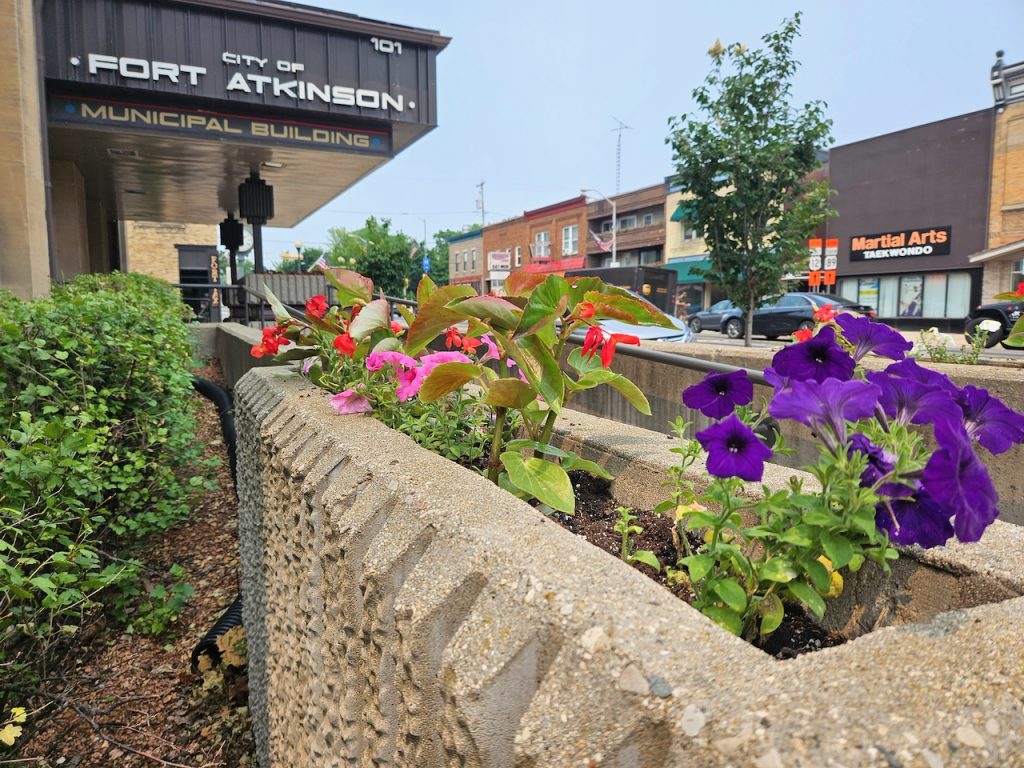By Chris Spangler
The Fort Atkinson Plan Commission approved a variety of language-related amendments to zoning ordinances when it met Tuesday afternoon.
Addressed were corrections to typographical errors and language clarifications relating to medium industrial land use, home occupations, off-street parking, fencing, building maintenance, landscaping, signage and swimming pools.
According to building inspector Jed Draeger, the city completed a full zoning ordinance rewrite in 2020; however, some minor tweaks were necessary.
He noted in a memo to the commission that most of the “proposed amendments are minor in nature and reflect small errors that have been identified within the ordinance that need to be corrected for consistent administration of the ordinance and clarification in key areas of the text. This is not uncommon due to the length of the ordinance and the interconnected nature of each section, which aims to build upon one another.
“Overall, the proposed amendments can be categorized as administrative tweaks and do not change much in the way of policy or procedures,” he added.
City staff worked with consultant Vandewalle and Associates, which helped write the new zoning ordinance, to identify the changes. The Plan Commission unanimously advanced the amendments to the council for approval.
Commissioners discussed a handful of the 21 items, including the parking of vehicles or equipment not normally associated with a residential use. Vehicles parked or stored outdoors on a residential property would be disallowed unless a home-occupancy permit has been issued.
“Right now, if you have a home-occupancy permit, you are allowed to use your home-occupation vehicle, of course,” Draeger told the commission, referring to those for a business, for instance. “But there is no limitation to the number of those vehicles.
“In a couple areas in the city, that has arisen as a problem, and I think this clarifies what the zoning ordinances are looking for … which is (for the vehicle) to not have any outside impact.”
He added, “When a business has three or four business vehicles parked outside, it’s definitely showing an impact on the neighborhood.”
Fencing standards language also was cleared up.
“This clarifies that no chain-link fencing is allowed in the front or side yard of a residential lot and can not extend past the front of the building in residentially zoned properties,” Draeger said.
Citing an example, he said that an applicant was seeking security fencing in an industrial area, but the current ordinance allowed only a 4-foot fence.
“That doesn’t do much for security, so in that provision, we would be allowing for a taller fence (up to 6 feet) in the front and side yard for that, but it would have to be more of a decorative fence and not in the style of a chainlink fence,” Draeger noted.
Residential swimming pool fence size also was discussed.
“Right now, we require a 6-foot fence to be installed with any pool installation. The industry standard is 4 feet with a self-locking gate. The change would be just putting it down to the 4-foot requirement, as would be the industry standard,” Draeger said.
“But it also would allow for an above-ground pool to be installed that would have the 54-inch wall or higher that would not be required to have a fence around the yard, because it still would meet those requirements for safety,” he added. “In addition, the current minimum of 42-inch fencing for pools is being increased to 48 inches to meet the industry standard.”
Thus, the change reads: ”Pools shall not be required to have a fence if each side of the pool structure is a minimum of 54 inches tall and a removable ladder or gate is provided, or the pool structure is less than 54 inches tall, but has approved wall height extensions and a removable ladder or gate is provided, as approved by the zoning administrator.”
It does not apply to existing fences that are at least 48 inches in height that otherwise comply with this section.
Also discussed was building maintenance on private properties.
“That is something that was in our old ordinances, the one prior to this. This is simply putting it back. It does call for people to maintain their property: peeling paint, things falling off their house, things like that, to keep it in a level of upkeeps,” Draeger said.
Specifically, the change states that it is “unlawful to allow a building or structure to become substantially deteriorated through poor or no maintenance so that the structural integrity of the building becomes a health and/or safety concern.”
In addition, “all exterior surfaces of a building or structure that are not inherently resistant to deterioration shall be treated periodically with a protective coating of paint or other suitable preservative that will provide adequate resistance to weathering and maintain an attractive appearance.”
Violations are subject to penalties.
The zoning language changes also increase the size of order-board signs, such as those at fast-food restaurants, from 24 square feet to 48 square feet.
During a public hearing, Fort Atkinson resident John Donohue asked about enforcement of these ordinance changes.
Draeger explained that a letter would be sent to the property owner giving notice of the ordinance violation.
“They would have a timeframe to go through that does depend on the severity of the ordinance,” he said. “At that point, they do get a second letter … that is giving them a time period to fix or come into compliance. And at that time, we are allowed to issue citations through the police department.”
During the Plan Commission’s discussion, member Eric Schultz asked whether the city is aware of anyone who would be not in compliance with any of the zoning changes, were they enacted.
Draeger said he is not aware of anyone with a home-occupation permit who would be in violation.
“Most of these, when they are pre-existing, you cannot go backward,” Draeger said, noting the current homeowners would be grandfathered in.
However, the zoning amendments would come into play if items in question were replaced, with the exception of home occupation.
Schultz said that, regarding the number of vehicles a small businessperson can have on his or her property, he wants to make sure that such people are not targeted.
“I want to make sure we are being friendly to growing businesses, etc., within our city,” he said.
City Manager Rebecca Houseman added that “the goal of a home occupation is to ensure that it doesn’t have an impact on the surrounding residences, because it is a residential neighborhood … and things that are commercial in nature should be in areas that are zoned for appropriate uses. So there is a degree of protecting the residential character of a neighborhood …”
Commissioner Loren Gray asked about changing the height of order-board signs from 24 square feet to 48. Draeger said this was coming up as an issue as restaurants added more drive-through lanes.
“If the 24-square-foot sign was adequate for a lane, why are we increasing the size of the sign and not just adding signs?” He asked.
“I think you would see on a number of order-board signs in town that the add-ons to those signs make them bigger than 24 square feet,” Draeger responded.
The commission unanimously advanced the amendments to the city council, recommending its approval.
The list of proposed language-related zoning amendments is here: https://cms8.revize.com/revize/fortatkinson/6.27.23%20COFA%20Plan%20Commission%20Packet.pdf.
Certified survey maps
Also Tuesday, the panel unanimously recommended, with a couple contingencies, that the city council approve certified survey maps (CSM) for properties on Montclair Place and East Sherman Avenue.
Owner Aeryn Barry requested a two-lot CSM for a parcels located at 1712 and 1714 Montclair Place in order to separate the existing lot, zoned DR-8 Duplex Residential, into two separate lots.
This would allow for building a duplex or twin house using the zero-lot line zoning mechanism.
Draeger noted in his memo that currently, a duplex is being built on the parcel using the existing plat. The lot division creating 1714 Montclair Place will enable the owner of each side of the twin home to own and maintain his or her half of the existing lot.
In addition, each twin house must provide separate public water and sanitary sewer laterals and electric service to each of the two dwelling units.
“We do have a maintenance on the common wall and there will be separate hookups for each unit as required by our ordinances,” Draeger said.
He noted that this concept will be identical to that of nearby properties.
The commission also recommended that the city council approve a two-lot CSM for parcels at 624 and 704 E. Sherman Ave.
The land owned by Terry A. Duch currently is zoned SR-2 Single-family Residential. He would like to break off a portion of 624 E. Sherman Ave. and join it with the contiguous parcel at 704 E. Sherman Ave.
Draeger’s memo explained that the SR-2 zoning district has a required minimum lot width of 100 feet, while the parcel at 624 E. Sherman Ave. currently measures 91.74 feet wide. The parcel at 704 E. Sherman Ave. has a width of 195.36 feet.
“He would like to separate out a portion of the existing two lots and retain the entire section bordering the river for his lot, and creating a separate smaller lot for the property located at 624 Sherman,” Draeger said.
Duch has agreed that the proposed north and south lot line should be moved east by 8.26 feet, enabling both lots to conform to the code.
The preliminary CSM shows the parcel at 624 E. Sherman Ave. increasing the width to 100 feet; however its depth is reduced to 244.94 feet and the total area lowered to 24,494 square feet.
The width of the parcel at 704 E. Sherman Ave. is reduced to 187.1 feet at the street and then increases to 287.10 feet for the southern portion of the lot. Its depth remains the same, but the square footage increases to 268,147 square feet. It also retains Rock River access.
The commission unanimously recommended council approval.

Fort Atkinson Municipal Building, file photo/Chris Spangler.
This post has already been read 2894 times!
